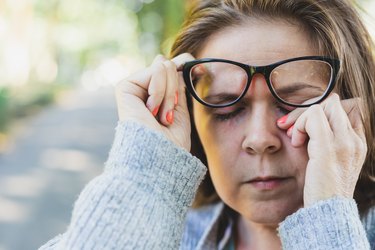
Waking up with red eyes? Don't just drop in some Visine and move on with your day. Instead, consider what might be going on to cause the redness. Addressing the underlying reason will lead you to a clearer tomorrow (without the need for eye drops in some cases).
Here are some possible explanations for your symptoms, and recommendations for getting rid of the red:
Video of the Day
Video of the Day
1. You’re Staring at Your Phone Before Bed
The Signs: Eyes Are Red, Irritated and Heavy
Does your bedtime routine include scrolling through social media under the covers? This isn't a great move for your eye health.
"Your blink rate decreases as you stare at a digital device," Corona, California-based "Glam Optometrist" Arian Fartash, OD, tells LIVESTRONG.com. "During a blink, when eyelids go down, this creates a layer of new tears that will sit on your eyeballs. Otherwise, tears evaporate and are not refreshed."
This contributes to dry eye, the symptoms of which can be redness, irritation and burning.
Dry eye from staring at your screens may happen during the workday, but you might be surprised to learn that doing it before bed can result in daytime problems.
"Friends will tell me that their eyes have been so irritated today, and I'll ask if they were on their phone last night," Dr. Fartash says. "And sure enough, they were."
The Fix
Using artificial tears regularly will re-moisturize your eyes. Also, avoid your phone in the hour or two before bed. (Stash it across the room if you must.)
Keep in mind that dry eye can be caused by multiple factors, including certain medications, medical conditions like thyroid problems and diabetes, using contact lenses and exposure to environmental irritants, the American Optometric Association (AOA) notes. See your eye doctor (an ophthalmologist or optometrist) to help identify the source.
Related Reading
2. You’ve Got Allergies
The Signs: Eyes Are Red, Itchy and Watery
If all you want to do is scratch your eyes because of out-of-control itchiness, well, it might be allergies, Dr. Fartash says.
Frustratingly, it might not always be apparent what caused these allergies. For instance, if you went to a friend's house with a cat (even if they closed the cat in another room), then you might experience allergy flare. If it's springtime, it might be a particularly high pollen count day (your phone's weather app can tell you).
The Fix
With so many OTC allergy medications out there, it's tempting to go to the drugstore and pick up something and hope it works. For uncontrolled allergies, however, it's important to see a board-certified allergist, who can help you come up with a plan for pre-season treatment to prevent symptoms as well as control them during the season.
Related Reading
3. Your Pillow Is Irritating Your Eyes
The Signs: Eyes Are Red and Itchy
Your pillow touches your face throughout the night, so if you wake up with bloodshot eyes, consider the possibility that it might be to blame.
"I always ask patients if they've recently switched laundry detergent or dryer sheets," Dr. Fartash says. It's especially telling that your pillow is behind your problems if only one eye — the side you sleep on — is red and irritated.
The Fix
Dr. Fartash recommends washing your pillow in hot water only (no detergent) and seeing if that helps. If symptoms disappear, it's time to switch your detergent or skip the dryer sheets altogether.
Other potential irritants include eyelash extensions (many folks are allergic to the glue) and cosmetics like eyeliner and mascara, Dr. Fartash says.
4. You Have a Bacterial Infection
The Signs: Eyes Are Red, Gooey and Crusty; Eyelids Might Also Be Red
This can range anywhere from little morning eye "boogers" to some serious crustiness.
Lots of things can lead to a bacterial infection, particularly if you touch something especially gross and forget to wash your hands. Some parents may experience this when they change their child's dirty diaper and later touch their eyes without a good hand scrubbing in between, Dr. Fartash says.
It could also be blepharitis, an inflammation of the eyelids that can also be caused by bacteria, the AOA says.
The Fix
"For an eye infection, you can see your eye doctor for antibiotic drops. Once you start treatment, the infection will go away quickly," Dr. Fartash says.
Blepharitis is treated by keeping the lids crust-fee, and an antibiotic may also be recommended, per the AOA.
Dr. Fartash also recommends using an eyelid cleanser before bed to remove residual makeup, bacteria and allergens. She likes optometrist-developed We Love Eyes, available on Amazon.
Signs: Eyes Are Red and Watery
If your bloodshot eyes don't seem to stem from any of the issues above, you could be dealing with a virus.
"I tell patients that this is like having a cold on your eye," Dr. Fartash says. "Unfortunately, there's nothing you can really do — you have to wait it out," she adds.
The Fix
Antibiotic drops might be recommended if you develop a secondary bacterial infection, but otherwise, practice some good eye hygiene for the week. Keep your face clean, don't touch your face or eye (you can transfer the infection from one eye to the other) and wash your hands often.
Dr. Fartash also advises patients who wear contacts to switch to glasses while things clear up, which has the bonus of keeping your fingers away from your eyes.
Related Reading
Is this an emergency? If you are experiencing serious medical symptoms, please see the National Library of Medicine’s list of signs you need emergency medical attention or call 911.